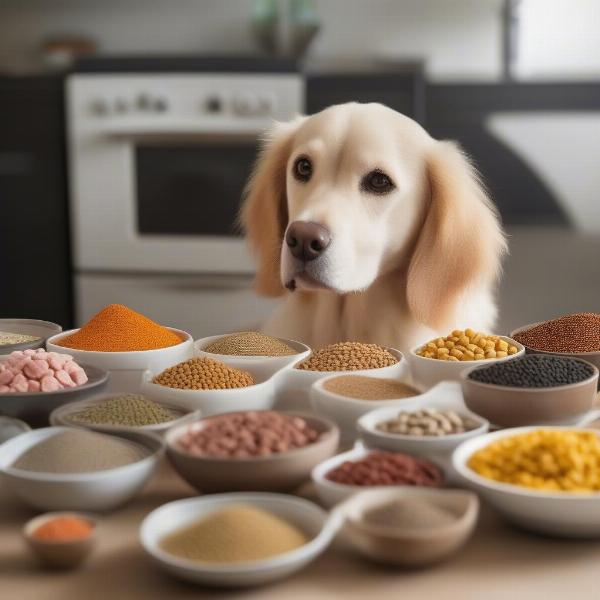Finding the right dog food can be a challenge, especially if your furry friend has a sensitive stomach. In the UK, there’s a wide variety of dog foods marketed for sensitive digestion, but choosing the “best dog food for sensitive stomachs uk” requires careful consideration of ingredients, your dog’s specific needs, and even your budget. This article will guide you through the process of selecting the perfect food to soothe your dog’s tummy and keep them happy and healthy.
Common signs of a sensitive stomach in dogs include vomiting, diarrhoea, excessive gas, and itchy skin. If your dog regularly experiences these symptoms, switching to a specially formulated dog food might be the solution.
Identifying the Culprit: Common Food Sensitivities in Dogs
Understanding what triggers your dog’s sensitive stomach is crucial in selecting the right food. Some of the most common culprits include certain proteins like beef, chicken, and dairy, as well as grains like wheat and corn.
- Proteins: While essential, some proteins can be difficult for sensitive dogs to digest. Look for foods featuring novel proteins like lamb, venison, or fish, or hydrolyzed proteins, which are broken down into smaller pieces for easier digestion.
- Grains: Grains often get a bad rap, but not all grains are created equal. Some dogs thrive on grain-free diets, while others may tolerate certain grains like brown rice or oats.
- Additives and Fillers: Artificial colours, flavours, and preservatives can also irritate a sensitive stomach. Opt for foods with natural ingredients and avoid unnecessary fillers.
 Choosing food for dogs with sensitive stomachs
Choosing food for dogs with sensitive stomachs
Key Ingredients to Look For in Sensitive Stomach Dog Food
When searching for the best dog food for sensitive stomachs in the UK, keep an eye out for these beneficial ingredients:
- Prebiotics and Probiotics: These support a healthy gut microbiome, aiding digestion and reducing inflammation.
- Digestible Fibre Sources: Ingredients like beet pulp and pumpkin can help regulate bowel movements and improve stool quality.
- Omega-3 Fatty Acids: These have anti-inflammatory properties and can help soothe irritated digestive tracts.
- Limited Ingredient Diets: These diets contain a reduced number of ingredients, making it easier to identify and eliminate potential allergens.
Navigating the UK Dog Food Market for Sensitive Stomachs
The UK market offers a vast selection of sensitive stomach dog foods. From dry kibble to wet food and even raw diets, there’s something for every dog. However, “best dog food for sensitive stomachs uk” is subjective and depends on your individual dog’s needs.
- Dry Kibble: Convenient and often more affordable, dry kibble can be a good option for dogs with mild sensitivities.
- Wet Food: Higher in moisture content, wet food can be beneficial for dogs who struggle to stay hydrated or have difficulty chewing dry kibble.
- Raw Diets: While increasingly popular, raw diets require careful preparation and handling to minimise the risk of bacterial contamination. Consult with your veterinarian before starting your dog on a raw diet.
“When choosing a new food, it’s crucial to transition slowly,” advises Dr. Emily Carter, a veterinary nutritionist based in London. “Start by mixing a small amount of the new food with your dog’s current food and gradually increase the proportion over a week or two. This helps prevent further digestive upset.”
What to Avoid in Dog Food for Sensitive Stomachs
Just as important as what to include is what to avoid. Certain ingredients can exacerbate digestive issues in sensitive dogs. These include:
- Artificial Colors, Flavors, and Preservatives: These additives can trigger allergic reactions and irritate the gut.
- High-Fat Content: Fatty foods can be difficult to digest and may worsen diarrhoea and vomiting.
- Common Allergens: If you suspect your dog has a specific food allergy, avoid foods containing those ingredients, such as beef, chicken, dairy, or wheat.
Conclusion
Choosing the best dog food for sensitive stomachs UK requires a bit of detective work. By understanding your dog’s specific needs, identifying potential triggers, and selecting a food with the right ingredients, you can help your furry friend enjoy a happy, healthy digestive system. Remember to consult with your veterinarian if you have any concerns about your dog’s diet or digestive health.
FAQ
- What are the signs of a food allergy in dogs? Common signs include itchy skin, ear infections, vomiting, and diarrhoea.
- How long does it take to see improvement after switching dog food? You may see some improvement within a few days, but it can take several weeks for the full benefits to be realised.
- Can I make homemade dog food for a sensitive stomach? Yes, but it’s important to consult with a veterinary nutritionist to ensure the diet is balanced and meets your dog’s nutritional needs.
- Are grain-free diets always better for sensitive stomachs? Not necessarily. Some dogs tolerate certain grains well, while others may benefit from a grain-free diet. It depends on the individual dog.
- What should I do if my dog’s symptoms persist despite changing their food? Consult with your veterinarian. They may recommend further testing to rule out other underlying health issues.
- Is it expensive to feed a dog with a sensitive stomach? Not always. There are many affordable options available, and focusing on quality ingredients can save you money on vet bills in the long run.
- How can I transition my dog to a new food safely? Gradually mix the new food with their current food over a period of 7-10 days.
Related Articles:
is wainwrights dog food good
grain free dog food uk
About ILM Dog:
ILM Dog is your trusted resource for expert advice on dog care and nutrition. We provide comprehensive information on dog breeds, health, training, nutrition, grooming, and much more. From puppy care to senior dog care, we’re here to help you every step of the way. For personalized guidance on choosing the right food for your dog, contact our team of experts via email at [email protected] or call us at +44 20-3965-8624.